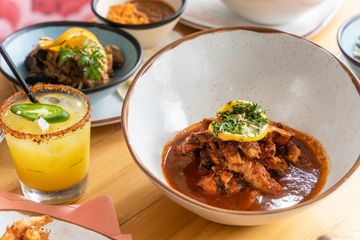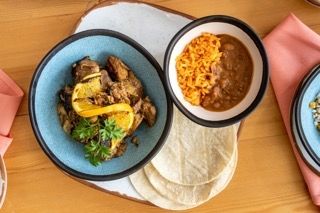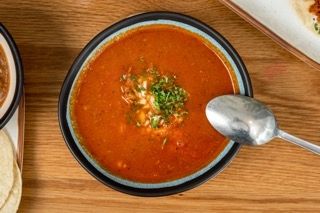Is Mexican Food Healthy? Unloading the Nutritional Advantages of Conventional Components
The concern of whether Mexican food is healthy invites an exploration of its traditional ingredients. Beans and corn work as fundamental staples, rich in healthy protein and fiber. Avocados offer helpful fats, while various herbs and seasonings include taste and wellness advantages - tacos. With each other, these elements create a tapestry of nutrition. However, the healthfulness of Mexican cuisine frequently depends on preparation methods and part dimensions. What duty do these aspects play in identifying its general dietary worth?
The Power of Beans: Healthy Protein and Fiber-Rich Staples
Typically ignored, beans serve as a keystone of Mexican cuisine, offering a riches of dietary benefits. Rich in protein, they are an exceptional plant-based alternative for those looking for to meet their dietary healthy protein requires. This high healthy protein web content supports muscle mass repair service and development, making beans vital for both meat-eaters and vegetarians alike. In addition, beans are an extraordinary resource of nutritional fiber, which aids in digestion and advertises a feeling of fullness, potentially assisting with weight monitoring.
The selection of beans used in Mexican dishes, such as black beans, pinto beans, and kidney beans, contributes to a varied taste account and can enhance meals nutritionally. Beans are low in fat and include vital vitamins and minerals, consisting of iron, magnesium, and folate. With each other, these characteristics make beans an important ingredient, providing both sustenance and food in typical Mexican price.

Corn: a Versatile Grain With Nutritional Conveniences
Corn sticks out as a functional grain essential to Mexican cuisine, commemorated not only for its cooking applications however also for its impressive dietary profile. As a key ingredient in recipes like tortillas, tamales, and pozole, corn supplies important nutrients that add to a well balanced diet plan. Rich in carbohydrates, it works as a significant energy source, while additionally being low in fat, making it a positive alternative for numerous nutritional demands.
Corn is a great source of dietary fiber, which aids in food digestion and advertises satiation. It includes substantial amounts of vitamins such as B-complex vitamins, which are essential for basal metabolism. The presence of antioxidants, especially carotenoids, adds to general wellness by decreasing oxidative stress. In addition, corn is gluten-free, providing to those with gluten level of sensitivities. Generally, the dietary benefits of corn underscore its significance in traditional Mexican food and its role in a healthy diet.
Avocados: Healthy Fats and Nutrients in Every Bite
Avocados play a substantial role in Mexican cuisine, matching meals with their creamy appearance and rich flavor. Past their cooking allure, avocados are celebrated for their remarkable dietary profile. They are an abundant source of healthy and balanced monounsaturated fats, which can aid reduced poor cholesterol levels and support heart health. Additionally, avocados are loaded with vital vitamins and minerals, including potassium, vitamin E, and B vitamins, adding to total health.
The high fiber web content in avocados help food digestion and advertises satiety, making them a valuable enhancement to any kind of meal. Their special nutrient structure can additionally sustain skin health and provide anti-inflammatory benefits. Integrating avocados right into conventional Mexican recipes or appreciating them as a standalone snack can improve both taste and nourishment, showing why they are a cherished staple in Mexican food. Generally, avocados offer a delicious method to appreciate healthy and balanced fats and crucial nutrients in every bite.

Herbs and spices: Flavorful Health Boosters
While enjoying the abundant tastes of Mexican food, one can not forget the vital the original source function that spices and herbs play in improving both preference and health and wellness. Ingredients such as chili, oregano, and cilantro peppers not only add to the lively flavor account however likewise give considerable wellness advantages. For circumstances, cilantro is understood for its purifying properties, assisting to eliminate heavy steels from the body, while oregano is loaded with anti-oxidants and possesses anti-inflammatory impacts.
Chili peppers, a staple in numerous Mexican dishes, contain capsaicin, which has been connected to improved metabolism and pain relief. In addition, flavors like cumin and coriander support food digestion and might help in blood glucose guideline. Including these delicious health and wellness boosters into meals not only boosts the cooking experience yet additionally advertises total health, making Mexican food not just delicious, yet additionally nutritionally helpful.
Standard Cooking Methods: Enhancing Nutrition and Taste
Traditional food preparation approaches in Mexican food play a vital duty in improving both nourishment and taste, as they typically prioritize classic methods and fresh ingredients. Strategies such as nixtamalization, where corn is saturated and cooked in an alkaline option, not just improve the nutrient profile of tortillas however also improve their digestibility - best mexican westchester NY. In addition, using slow food preparation methods, like cooking or braising, enables flavors to meld wonderfully while maintaining the stability of the ingredients

Often Asked Questions
Are Mexican Food Portions Typically Larger Than Other Cuisines?
Mexican food portions are commonly bigger than those of numerous various other cuisines. This particular mirrors typical eating practices, stressing common sharing and hearty dishes, which can bring about an extra significant serving size in general.
Just how Does the Preparation Method Affect Healthiness of Mexican Food?
Preparation methods significantly influence the healthiness of Mexican food. Methods such as cooking or steaming maintain nutrients, while frying can increase undesirable fat content. Choices of active ingredients and cooking styles inevitably identify total dietary worth.
Can Mexican Food Be Customized for Particular Dietary Limitations?
Mexican food can without a doubt be customized for certain dietary restrictions. Replacements, such as making use of corn tortillas for gluten-free diet plans or integrating even more veggies, enable people to take pleasure in traditional flavors while suiting various nutritional needs.
What Prevail Misunderstandings About Mexican Food and Wellness?
Usual mistaken beliefs about Mexican food consist of the belief that it is inherently unhealthy, excessively zesty, and exclusively concentrated on fats. In truth, conventional recipes commonly feature healthy components and can be customized to various dietary More Help needs.
Exist Much Healthier Options at Mexican Restaurants?
Healthier options at Mexican dining establishments often include barbequed meats, beans, and fresh vegetables. Choosing recipes that highlight whole active ingredients and preventing heavy sauces can result in a much more healthy eating experience, advertising overall wellness.
The selection of beans used in Mexican meals, such as black beans, pinto beans, and kidney beans, contributes to a diverse flavor account and can boost meals nutritionally. Avocados play a considerable duty in Mexican food, matching meals with their luscious structure and abundant taste. Integrating avocados into conventional Mexican meals or enjoying them as a standalone snack can enhance both flavor and nutrition, showing why they are a cherished staple in Mexican food. While taking pleasure in the abundant flavors of Mexican food, one can not ignore the essential function that spices and herbs play in improving both preference and wellness. Typical cooking approaches in Mexican food play an essential duty in enhancing both nutrition and taste, as they often focus on classic methods and fresh active ingredients.